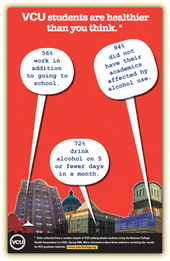By: Linda Hancock, Director, Wellness Resource Center, Virginia Commonwealth University
The Virginia Commonwealth University’s Clicker Enhanced Social Norms Marketing program began in 2005 with the goal of reducing high-risk drinking and related harm. At the heart of this program is the recognition that presenting students with accurate information about their peers’ alcohol use reinforces healthy behaviors.
The social norms marketing campaign is improved through alcohol education sessions utilizing clicker technology. In the sessions, students use hand-held wireless devices that transmit personal responses to questions asked, and their responses are instantly displayed as graphs. This immediate feedback shows students the gap between their perception and the reality of actual alcohol use on campus.
These sessions challenge participants to observe healthy behaviors rather than the unhealthy behaviors that often seem more visible. Data have demonstrated that students who participate in the clicker sessions have more accurate perceptions of normative alcohol use than those who do not attend a session and are more likely to limit their alcohol use.
The social norms marketing campaign is improved through alcohol education sessions utilizing clicker technology. In the sessions, students use hand-held wireless devices that transmit personal responses to questions asked, and their responses are instantly displayed as graphs. This immediate feedback shows students the gap between their perception and the reality of actual alcohol use on campus.
These sessions challenge participants to observe healthy behaviors rather than the unhealthy behaviors that often seem more visible. Data have demonstrated that students who participate in the clicker sessions have more accurate perceptions of normative alcohol use than those who do not attend a session and are more likely to limit their alcohol use.
 Click to enlarge
Click to enlarge Because the program proved to have such positive impact on the decision‐making development of students, ACHA awarded it the Best Practices in College Health Award in the category of Health Education and Promotion Services in 2010. The success of the program spurred VCU’s Wellness Resource Center to explore a variety of other misperceptions and how these can be addressed in a similar fashion.
This fall, through real-time clicker feedback, 1,867 incoming students were able to see that while most of them perceived that only 30% of Americans support LGBT people in being who they are, their own responses revealed that 89% of those freshman support LGBT people in being who they are.
Knowing the difference in perception versus reality is very useful, to both college health professionals and students, and that’s why we at VCU love our clickers. Anyone have other questions they have found helpful in making their campus healthier?
This fall, through real-time clicker feedback, 1,867 incoming students were able to see that while most of them perceived that only 30% of Americans support LGBT people in being who they are, their own responses revealed that 89% of those freshman support LGBT people in being who they are.
Knowing the difference in perception versus reality is very useful, to both college health professionals and students, and that’s why we at VCU love our clickers. Anyone have other questions they have found helpful in making their campus healthier?
Image of VCU Student Commons courtesy of Jeff Auth/Wikimedia Commons
Image of VCU poster courtesy The Wellness Resource Center/www.thewell.vcu.edu/research.html
Image of VCU poster courtesy The Wellness Resource Center/www.thewell.vcu.edu/research.html
 RSS Feed
RSS Feed